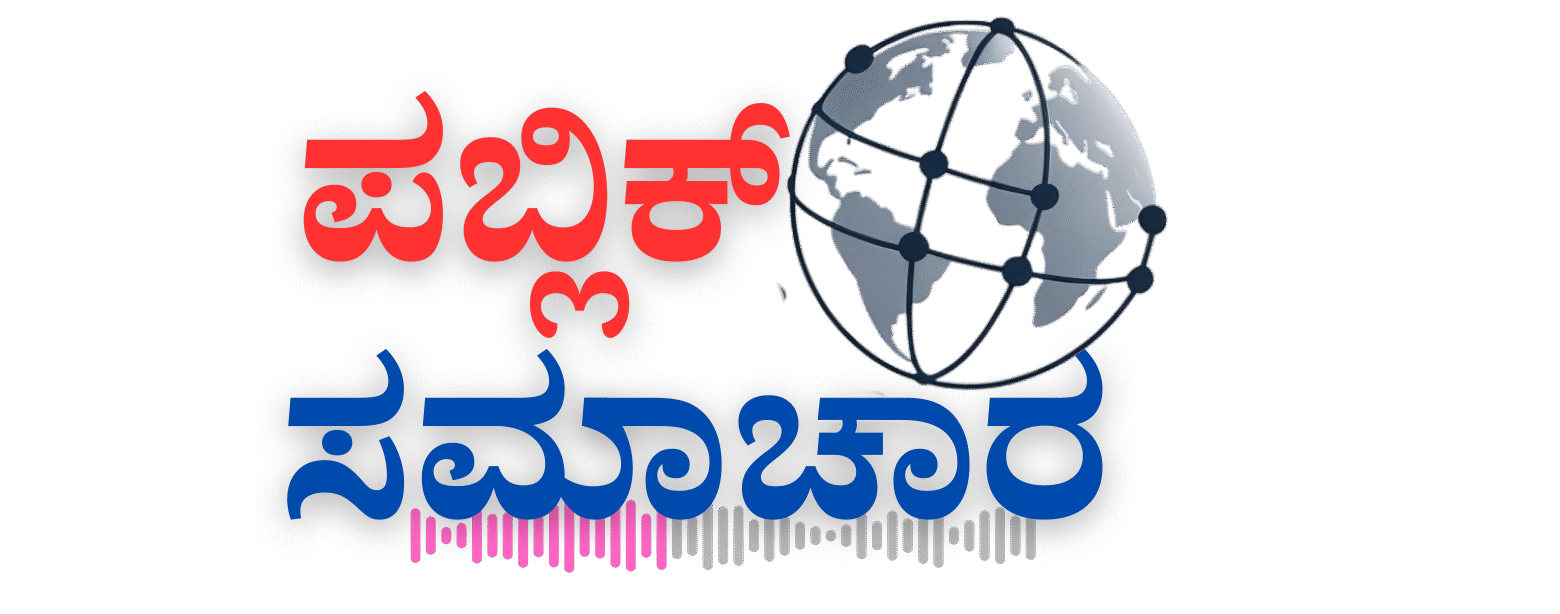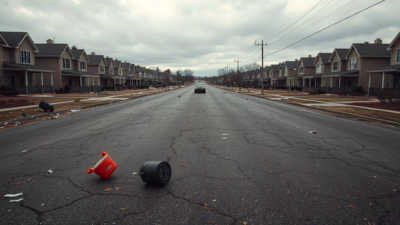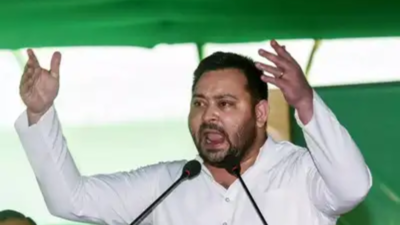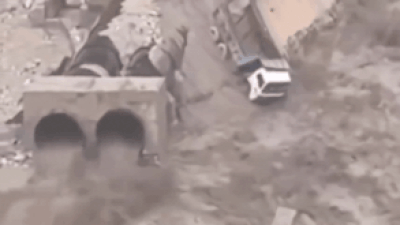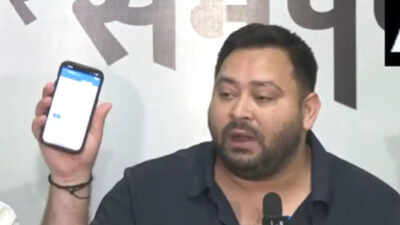Malegaon blast case: Sadhvi Pragya says she was tortured to name PM Modi; forced to lie about Yogi | India News
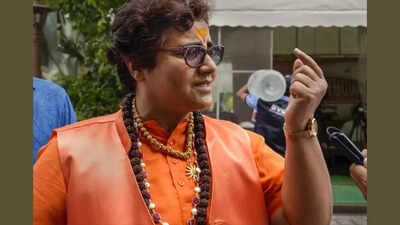
NEW DELHI: Sadhvi Pragya, recently acquitted of terror charges in the Malegaon blast case, claimed on Saturday that she was “tortured and forced to name Prime Minister Narendra Modi, UP chief minister Yogi Adityanath, RSS chief Mohan Bhagwat, and others”.The former Bhopal MP said she did not name them, as it was “a clear attempt to coerce her into lying”.“They made me name several people, including Ram Madhav. To do all of this, they tortured me. My lungs gave up… I was detained in a hospital illegally. All of this will shared in the story I am writing, but the truth cannot be buried. I lived in Gujarat, so they also asked me name Prime Minister Modi (who was then Gujarat chief minister). I did not take anyone’s name because they were trying to make me lie,” she said.She further claimed that the other names she was pressured to mention included Uttar Pradesh chief minister Yogi Adityanath, Mohan Bhagwat, and senior Sangh functionary Indresh Kumar. “They said take these names and we won’t beat you,” she alleged.After nearly 17 years, a special NIA court in Mumbai on July 31 acquitted all seven accused in the 2008 Malegaon blast case, including former BJP MP Pragya Singh Thakur and Lt Col Prasad Purohit. All were already out on bail.The blast, which struck Malegaon town in Nashik district on September 29, 2008, killed six people and injured over 100. The court ordered compensation of Rs 2 lakh to the families of the deceased and Rs 50,000 to each injured victim.In its verdict, the court noted that the chassis number of the motorcycle allegedly used in the blast had been wiped out. It also ruled that there was no reliable evidence proving that Thakur owned the vehicle. The court further observed that she had taken sanyas (renunciation) two years prior to the incident and had given up material possessions.
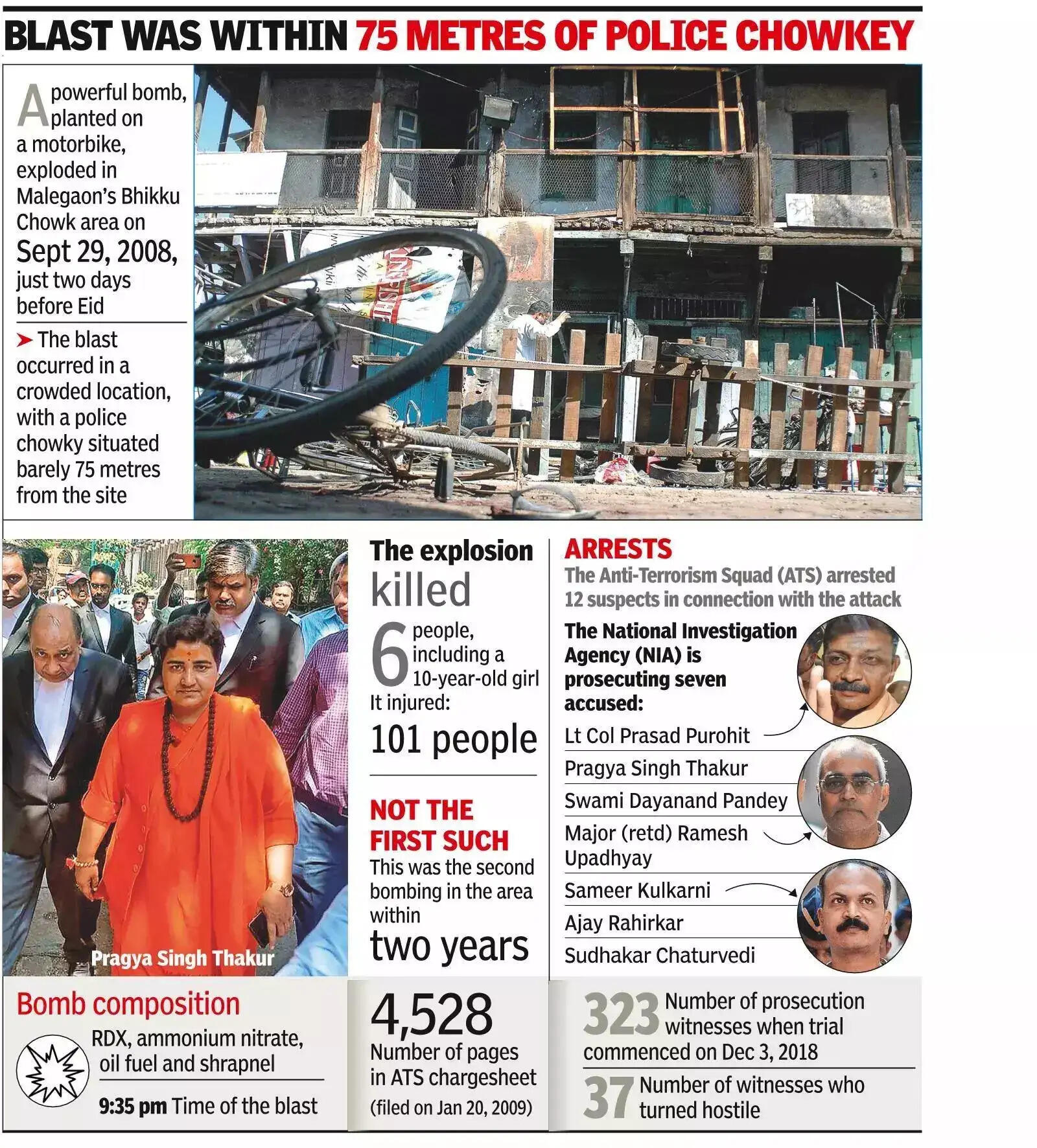
Malegaon case
What happened in 2008 An explosive device, allegedly strapped to a motorcycle, detonated near a mosque during the holy month of Ramzan and on the eve of Navratri festivities. Among the other accused acquitted are Major Ramesh Upadhyay (Retd), Ajay Rahirkar, Sameer Kulkarni, Sudhakar Chaturvedi, and Sudhakar Dhar Dwivedi. The ATS had alleged that the motorcycle used in the blast belonged to Thakur, while Purohit brought the RDX from Jammu and Kashmir and stored it in his house. Both denied the allegations. They were acquitted from charges under various stringent sections of the Unlawful Activities (Prevention) Act (UAPA) and the Indian Penal Code (IPC), including committing a terrorist act, conspiring to commit a terrorist act, criminal conspiracy, murder, and promoting enmity between religious groups. The investigation, initially led by the Maharashtra Anti-Terrorism Squad (ATS) under the late Hemant Karkare, quickly led to the arrest of Thakur and now Purohit in late 2008. The ATS, at the time, alleged, for the first time, the involvement of “saffron extremists” and linked the accused to a larger conspiracy, including other blast cases. Investigations into the alleged larger conspiracy of the Abhinav Bharat organization allegedly brought to light a series of crucial meetings, painting a picture of a group purportedly intent on avenging perceived atrocities against Hindus and establishing a “Central Hindu Government” (Aryawart). The prosecution contended that these gatherings demonstrate a calculated effort to strike terror by orchestrating a bomb blast in Malegaon, a Muslim-dominated area. The case took a significant turn when it was transferred to the NIA in 2011. In 2015, special public prosecutor Rohini Salian publicly alleged that the NIA had instructed her to “go soft” on the accused, leading to a change in prosecution. The NIA’s supplementary chargesheet in May 2016, accusing the ATS of planting RDX traces to frame Purohit and, notably, giving a clean chit to Thakur and others, citing insufficient evidence. Despite the NIA’s stance, the special court on December 27, 2017, ruled that seven accused, including Thakur and Purohit, would face trial under the stringent Unlawful Activities (Prevention) Act (UAPA), though charges under the Maharashtra Control of Organised Crime Act (MCOCA) were dropped. Finally, on October 30, 2018, terror and murder charges were formally framed against Thakur, Purohit, and five others. The trial, commenced on Dec 3, 2018. The proceedings were also characterized by over 323 prosecution witnesses, with 37 turning hostile, and a rejected plea for an in-camera trial. The trial also saw numerous dramatic moments. In June 2019, Pragya Singh Thakur, by then an elected Member of Parliament from Bhopal, famously caused a stir in court, complaining about the “dirty and small” chair and the “dusty” courtroom. The recording of final statements from the accused concluded in 2024, followed by the examination of eight defence witnesses. The long journey to judgment also saw five different judges preside over the case, with the tenure of the current special judge, A K Lahoti, recently extended by the Bombay high court till August 31, 2025, to ensure he could deliver the verdict. Final arguments concluded in April 2025, and after a brief adjournment from May 8, the matter was finally reserved for the verdict.
